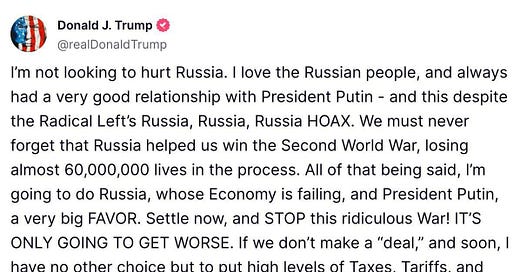Trump’s Threat of More Tariffs & Sanctions on Russia To Stop The War: Will It Work in the Long Run?
In a dramatic post on the X platform, former U.S. President Donald Trump issued a stark warning to Russia regarding its ongoing "Special Military Operation" in Ukraine. Trump declared his intention to impose high tariffs and sanctions on Russian exports to the United States and other allied nations if the conflict is not resolved swiftly. While his statement underscores a strong push for negotiations and a peaceful resolution, the broader implications of such measures raise questions about their long-term impact on Russia and global geopolitics.
⚡️📣ATTENTION:⚡️📣If you think my work is worth it please Go head and become a PAID SUBSCRIBER for just 8$ a month.
It will help me maintain my journalism in a stable way. ⚡️📣
Trump’s Message: Tough Love or Strategic Move?
Trump's social media post was both a warning and an appeal to Russian leadership. He emphasized his historical appreciation for Russia, acknowledging its sacrifices during World War II and his own "good relationship" with President Vladimir Putin. Yet, his tone shifted to a firm ultimatum:
“Calm down now and STOP this ridiculous war! IT WILL ONLY GET WORSE. If we don’t make a ‘deal’, I will have no choice but to impose high taxes, tariffs, and sanctions on everything Russia sells to the United States.”
Trump’s approach appears to blend economic pressure with diplomatic overtures, offering a chance for a peaceful resolution while threatening severe economic consequences. However, his statement also raises doubts about whether such punitive measures would genuinely influence Russian behavior or achieve lasting results.
Sanctions and Tariffs: Short-Term Pain, Long-Term Resilience
How Sanctions Hurt Russia:
Economic Isolation: Sanctions on key exports like energy, metals, and technology could shrink Russia’s trade revenue and further isolate it from Western markets.
Currency Volatility: Increased tariffs and restrictions on financial institutions could destabilize the ruble, triggering inflation and eroding public confidence in the economy.
Technology Gaps: Export controls on advanced technologies, such as semiconductors, could cripple Russian industries reliant on foreign components.
Why They Might Not Hurt in the Long Run:
Economic Diversification: Russia has already pivoted its trade relationships toward non-Western partners, such as China, India, and Turkey. These countries have been willing to purchase Russian energy and other goods, even at discounted rates.
Domestic Adaptation: Over the years, Russia has developed domestic alternatives to imported goods and technologies. While not perfect substitutes, these efforts mitigate the long-term damage caused by Western restrictions.
Energy Leverage: As a major global supplier of oil and gas, Russia remains indispensable to the energy security of many nations, particularly in Europe and Asia. Even with sanctions, it finds buyers for its energy exports, albeit at reduced profitability.
Trump’s Plan: Symbolic or Substantive?
While Trump’s threat of economic measures is bold, its actual implementation would depend on the international cooperation of other major economies. Unilateral U.S. actions could push Russia closer to alternative markets and strategic allies, further diminishing the influence of Western sanctions.
Moreover, Russia’s leadership has historically demonstrated resilience in the face of economic adversity, leveraging nationalism to consolidate domestic support. Putin’s government could frame Trump’s threats as an extension of Western hostility, reinforcing public support for the ongoing military operation.
The Bigger Picture: Global Ramifications
Trump’s proposed tariffs and sanctions could also backfire on the United States and its allies:
Energy Prices: A reduction in Russian energy exports could spike global oil and gas prices, hurting Western consumers.
Geopolitical Realignments: Aggressive sanctions might accelerate the creation of parallel financial and trade systems outside of Western control, weakening U.S. influence.
Economic Blowback: American industries reliant on certain raw materials from Russia, such as metals for manufacturing, could face higher costs and supply disruptions.
It will help me maintain my journalism in a stable way. ⚡️📣





Well, America admit, then that it put Zelensky in power with the color revolution? Will it admit about the bio labs? Will it admit that Zelensky has been mass murdering Russians in the western part of the country as of with use of the Azof Batallion? Will it admit that it disregarded the Minsk agreements? it seems as if Putin has to comply and if he does, then it’s an admission of his aggression. Also will the west cover up all the crimes it did in Ukraine as I just mentioned.
The Global South has moved on from the US sphere of influence. The time of global hegemony has long passed. The US and its 'allies' will suffer in the long term. Donut Thump will thrash and bully - to no avail.